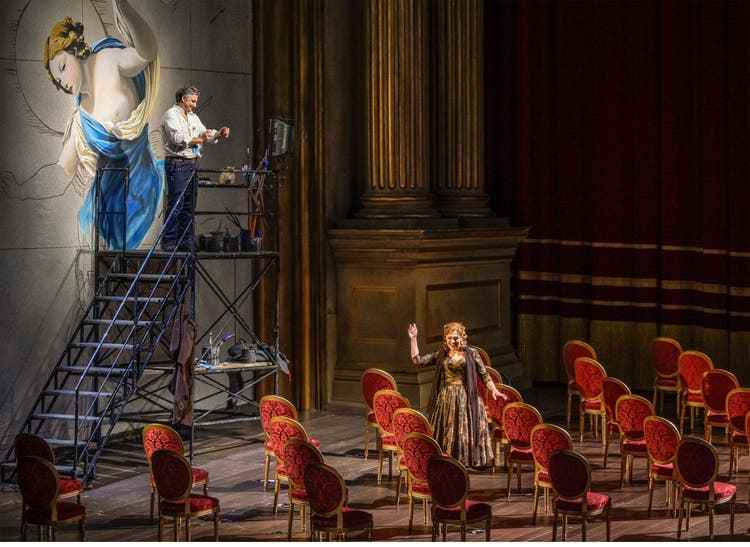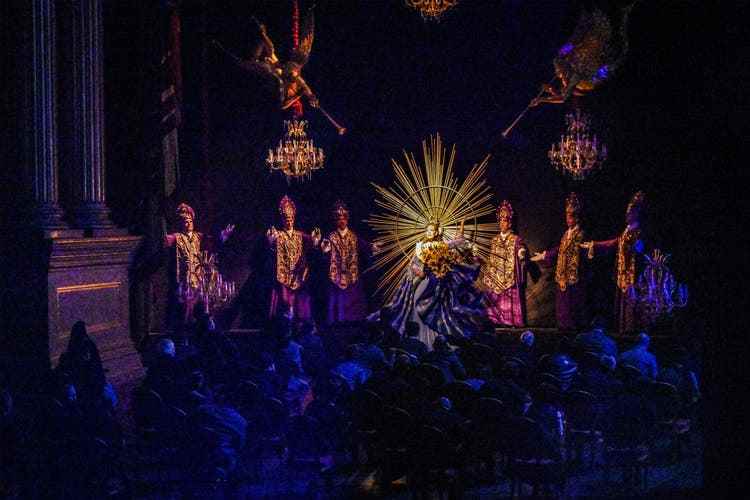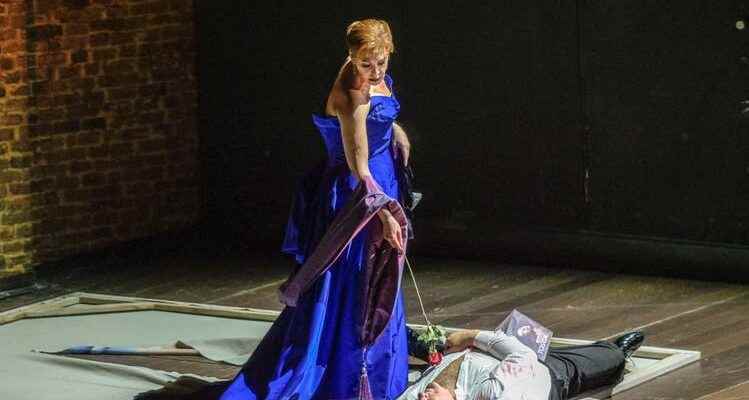Jonas Kaufmann and Bryn Terfel provide star glamor and a sold-out house at a gala performance of Puccini’s opera thriller. But only the third in the group, the soprano Sondra Radvanovsky in the title role, makes the evening an unforgettable event.
The whole of Rome trembled before him: Tosca (Sondra Radvanovsky) stabbed police chief Scarpia (Bryn Terfel) in self-defense.
What a boost: gala prices, full house, high tension in the Zurich Opera. Because for the revival of Giacomo Puccini’s “Tosca” two world stars had announced themselves in the two male lead roles of the play: Jonas Kaufmann and Bryn Terfel. It was a return of sorts for Kaufmann – he sang the role of the painter Mario Cavaradossi almost fourteen years ago in the premiere of this still-convincing production by Robert Carsen. And it goes without saying that the Munich Tenorissimo was the main attraction for many opera lovers now that it is no longer heard very often in Zurich.
Kaufmann lives up to expectations, especially in the second part of the performance, conducted for the first time by General Music Director Gianandrea Noseda. Here he really catches fire and perfectly captures the elusive character of the artist bon vivant Cavaradossi, who the events turn against the police regime of Baron Scarpia against his will. Kaufmann’s completely unleashed «Vittoria! Vittoria!» Triumph in the notorious interrogation scene of the second act becomes a highlight of the evening: here the figure of the tortured triumphs ideally – and vocally as emphatic as rarely – over the injustice of the torturers.
The turn to melancholy that Kaufmann makes in the third act is all the more touching: here Cavaradossi has lost all idealism and finished with life; he no longer believes in salvation – and certainly not in the liberation promised by his beloved Tosca through a mock execution, which will turn out to be exactly that: as a sham and final feint by the villain Scarpia. In the wonderfully introverted, vocally perfectly controlled aria «E lucevan le stelle», Kaufmann lets melancholy run free: This is, in the spirit of Puccini, no longer a rebellion, but a last erotic fantasy of his love for Tosca, beguilingly accompanied by the equally subtly restrained Clarinet solo.
Fireworks from the ditch
However, it will be a while before Thursday’s performance reaches this level. In the first act, Kaufmann still seems a bit distant, he sings impeccably, but is clearly concerned about security – which makes the opening aria “Recondita armonia” seem more like a request concert hit. Perhaps Kaufmann simply has trouble asserting himself against the nervously flickering fireworks that Gianandrea Noseda ignites in the orchestra pit from the very first bar. Apparently, Noseda doesn’t feel the slightest desire to just accompany an expensive singer’s spectacle on this evening – he helps the music drama to its right with decidedly symphonic access, dynamic escalations and often more fluid than usual taken tempi.

Great theatre: Cavaradossi (Jonas Kaufmann) and Tosca (Sondra Radvanovsky) love each other passionately, but Tosca’s jealousy will be their undoing.
With the energy explosion from the ditch, Bryn Terfel as Scarpia is also strange at first. When he makes his appearance, this chief of police looks like a relaxed elderly gentleman (unfortunately also because of an ill-fitting wig) who happens to be dropping by a Roman church. There is still no sign of demoniac and the sadistic cravings blazing within him. Only in the grandiose “Te Deum” at the end of the act does Terfel fully embrace Noseda’s furor (and tempi) and drop the mask of the nice uncle. A coherent role concept could develop from this in the five performances that follow until the beginning of January – here it still seems like a feeling of feeling and warming up to each other.
The fact that the stage and the musical drama still gain the upper hand in the revival on Thursday is largely due to the third member of the group: the American soprano Sondra Radvanovsky. She has been less well known in Europe, at least not as prominently as Terfel and Kaufmann, but has already gained a wealth of role experience as Tosca at the New York Metropolitan Opera – next summer she will return to Zurich for the title role in the new “Turandot”. .
Radvanovsky’s harsh but colorful voice is actually too big for the Zurich house, which is almost intimate compared to the Met, but she quickly adapts to the acoustic conditions (with some piano efforts at the end of «Vissi d’arte, vissi d’amore» ). At the same time, she keeps the gestures for her opera character, which are always a bit too expansive and always a touch too passionate – a diva straight out of a picture book. And that’s exactly what Tosca, the celebrated singer, has to be according to the libretto!
A woman in existential need
Above all, however, Radvanovsky infects the two masters of creation with her intensity – suddenly Kaufmann and Terfel forget the mere beautiful and correct singing, the performance turns into that unique psychological thriller, the “Tosca” to one of the most gripping operas ever power. You don’t give each other anything anymore, neither vocally nor acting, and especially between Radvanovsky and Terfel a power game of life and death breaks out, in which the diva really only escapes by a hair’s breadth and with the help of a dagger from Scarpia’s rape.
This always violent scene seems even more shocking today, in the light of #MeToo and the events surrounding Harvey Weinstein, especially since Radvanovsky puts aside everything operatic here for a moment and shows a harassed woman in existential distress. By then, at the latest, no one would just enjoy a nice gala spectacle anymore – this is opera that jumps out at you and captivates you. In the end, the singer is celebrated by the audience for her outstanding performance – even a bit more frenetically than Kaufmann and Terfel. So it is right!

